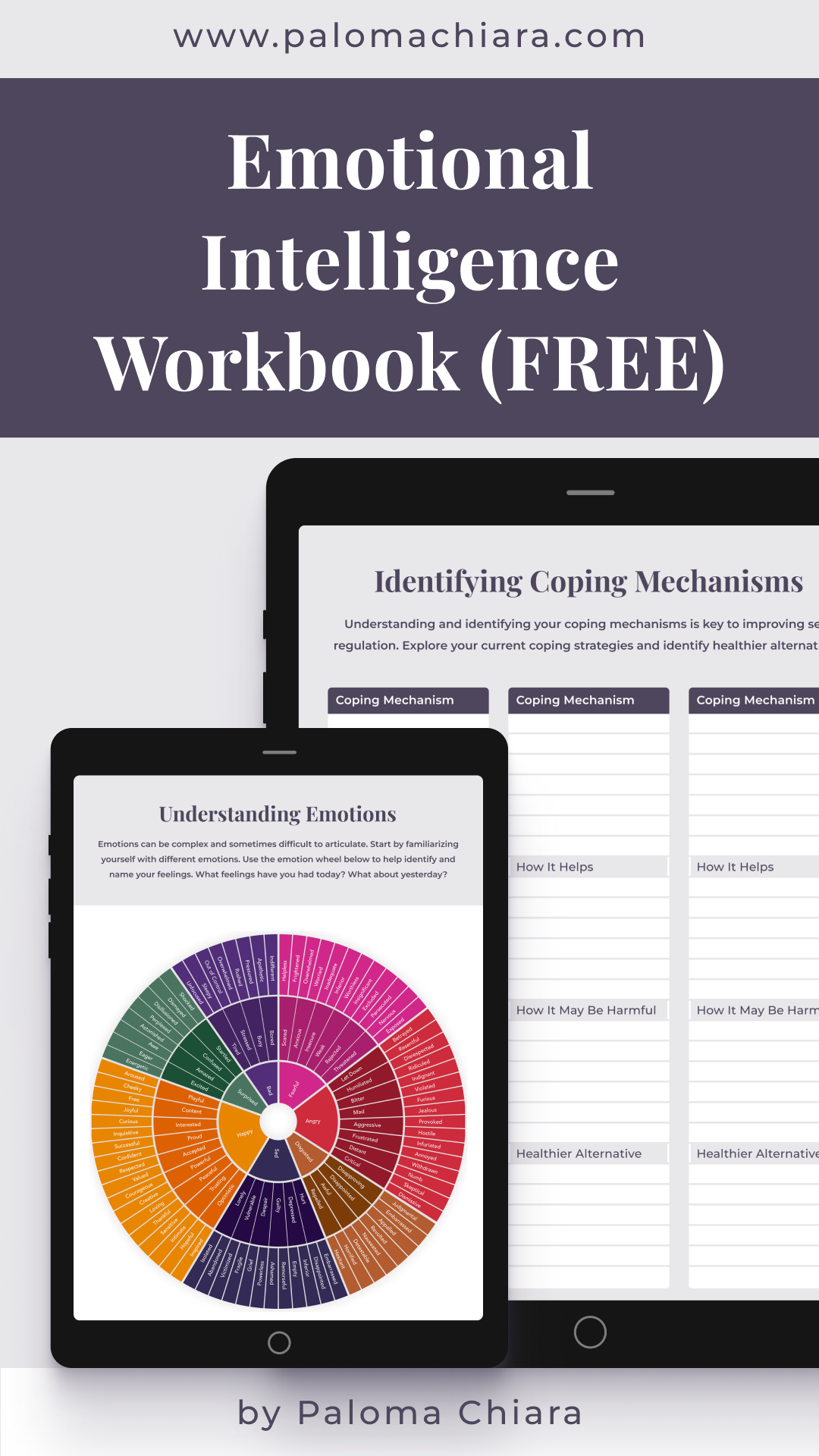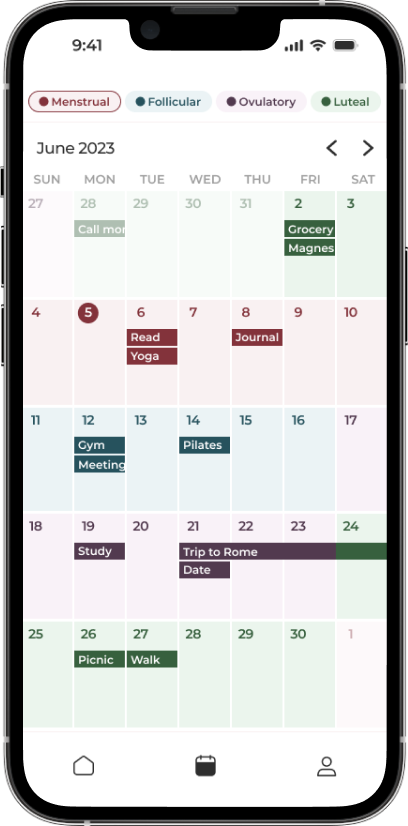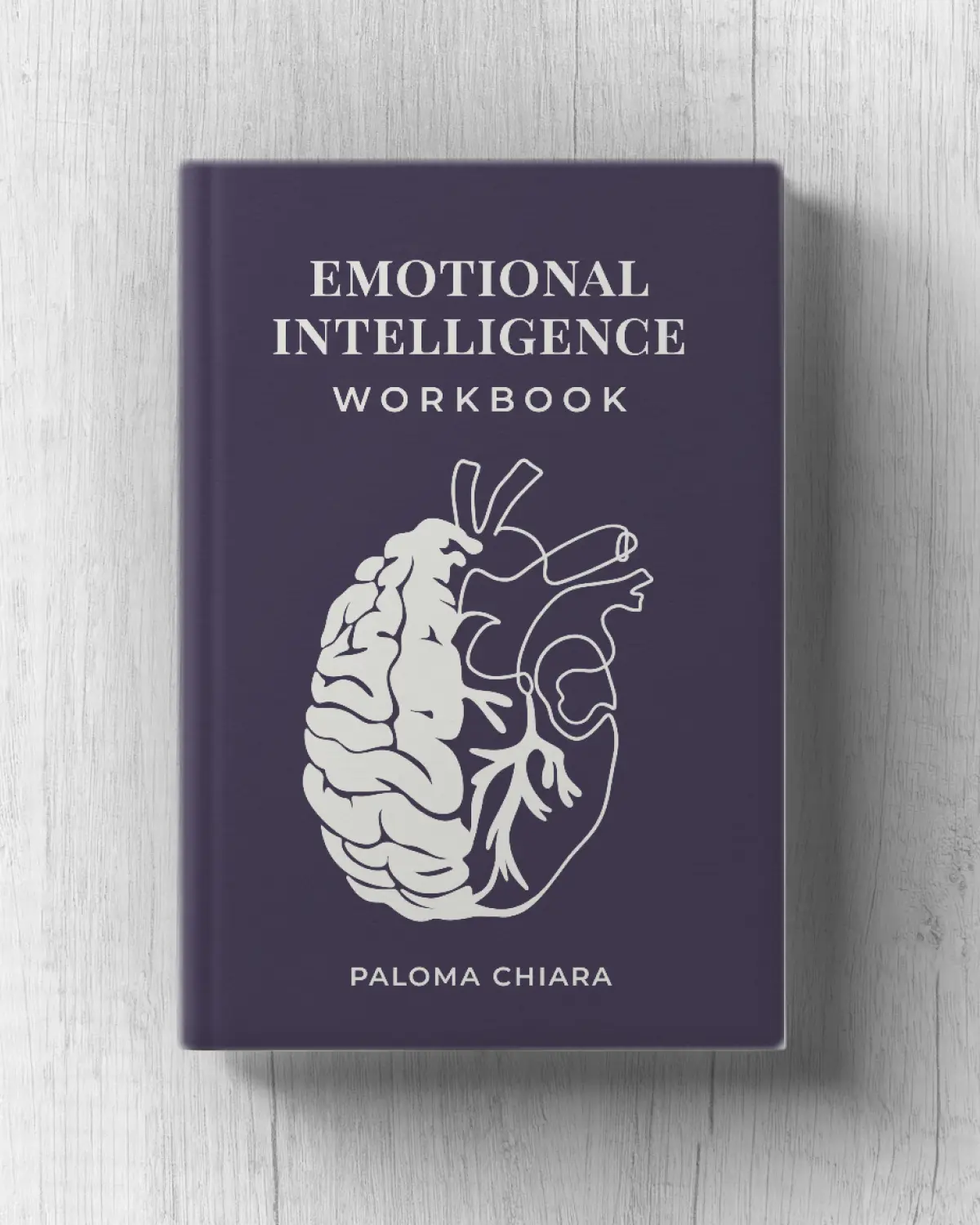
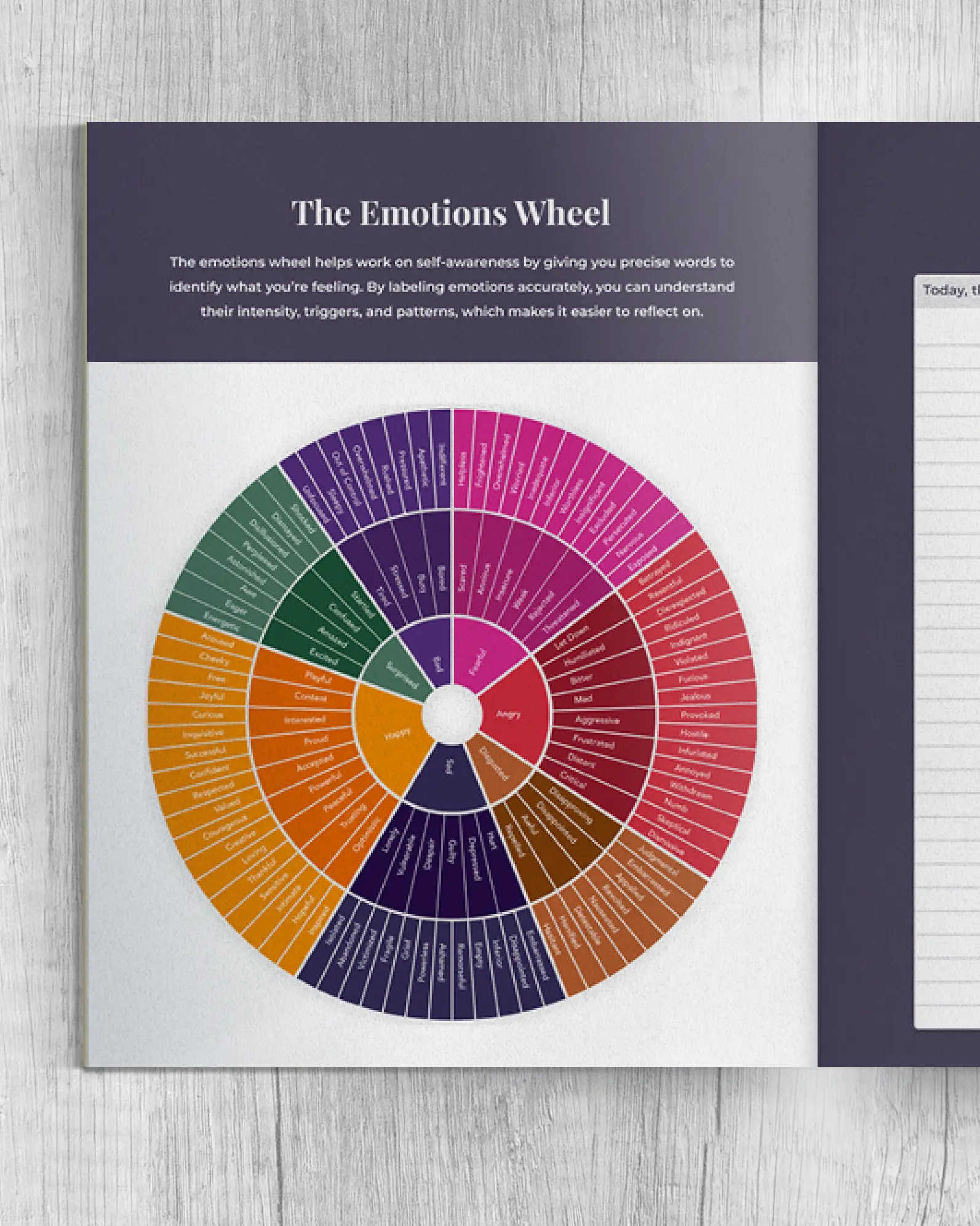
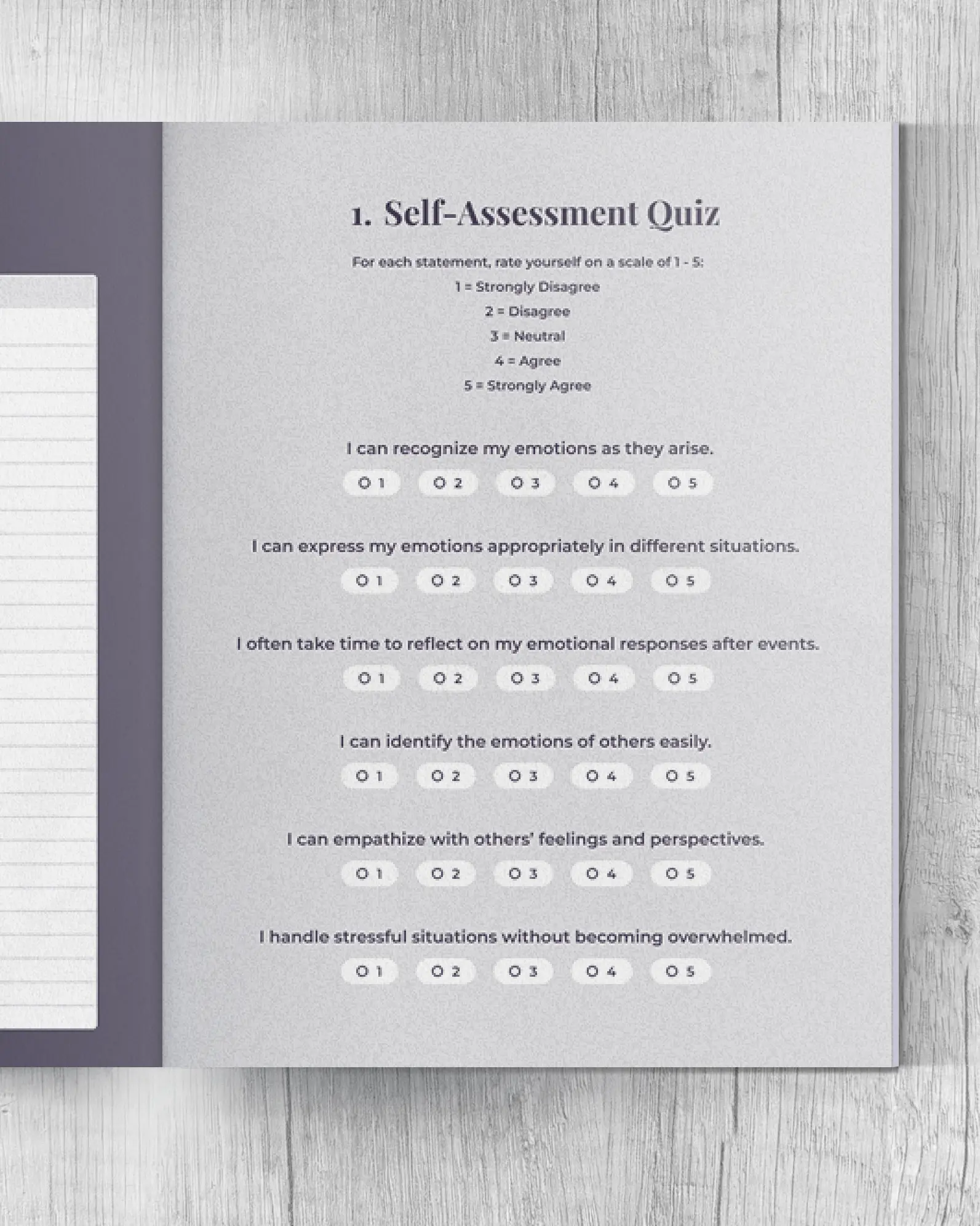
Free · Emotional Intelligence Workbook
workbook
Starting from:
0$
Inside, you’ll find sections dedicated to self-awareness, self-regulation, motivation, empathy, social skills, building resilience, and emotional regulation techniques.
Each section is thoughtfully crafted to help you explore your emotions, understand their impact on your behavior, and develop the tools needed to manage them effectively. Engaging worksheets encourage deep reflection, allowing you to track your progress and apply what you learn to real-life situations.
 Download Free PDF (0$)
Download Free PDF (0$)
 Buy Paperback (15$)
Buy Paperback (15$)
-

Free PDF · Emotional Intelligence
Here’s what you’ll find in this transformative workbook:
- Sections on self-awareness, self-regulation, motivation, empathy, and social skills
- Practical exercises and reflection prompts to deepen your understanding of your emotions
- Techniques for building resilience and effectively managing emotional challenges
- Thoughtful strategies for cultivating meaningful relationships and enhancing interpersonal communication
-

PDF & Paperback
PDF (Digital)
Instant download after purchase. Can be printed or used digitally. Compatible with PDF viewers and note-taking apps such as GoodNotes.
Paperback (Physical)
Shipping fees and delivery times vary depending on location and are calculated at checkout.
Both versions contain the same content, are 60 pages long, are in English, and are for personal use only.
All artwork is hand-made by the author Paloma Chiara.
Download Free PDF (0$)
Buy Paperback (15$)
FAQs About Emotional Intelligence
Emotional intelligence (EI) refers to the ability to recognize, understand, and manage your own emotions, as well as the ability to recognize, understand, and influence the emotions of others. It encompasses skills such as emotional awareness, empathy, self-regulation, motivation, and social skills, allowing individuals to navigate social complexities, communicate effectively, and build strong relationships.
Are Emotional Intelligence Tests Accurate?
Emotional intelligence tests can provide insights into an individual’s EI abilities, but their accuracy can vary. Self-report assessments may be influenced by personal biases or a lack of self-awareness, while ability-based tests tend to measure skills more objectively. However, no single test can capture the entirety of a person’s emotional intelligence, so it’s best to consider results alongside other assessments and observations.
What Are Emotional Intelligence Traits?
- Self-awareness: Understanding your emotions, strengths, weaknesses, and triggers.
- Self-regulation: Managing your emotions and impulses effectively.
- Motivation: Using emotional factors to drive your goals and maintain a positive outlook.
- Empathy: Recognizing and understanding the emotions of others.
- Social skills: Building relationships, communicating effectively, and navigating social complexities.
Can Emotional Intelligence Be Learned?
Yes, emotional intelligence can be learned and developed over time. While some people may have a natural inclination toward emotional intelligence, individuals can enhance their EI through practice, training, and self-reflection. Techniques such as mindfulness, active listening, and empathy exercises can significantly improve one’s emotional intelligence.
Can Emotional Intelligence Be Measured?
Emotional intelligence can be measured through various assessments, including self-report questionnaires, ability-based tests, and 360-degree feedback. These assessments evaluate different aspects of emotional intelligence, such as emotional awareness, empathy, and social skills. However, it’s essential to interpret the results in context, as emotional intelligence is complex and multifaceted.
Can Emotional Intelligence Decrease?
Emotional intelligence can decrease if individuals become disengaged, face chronic stress, or experience significant life changes that negatively impact their emotional well-being. Consistent neglect of emotional skills can lead to a decline in EI, but it can be re-energized through intentional practice and learning.
Can Emotional Intelligence Be Used Negatively?
While emotional intelligence is generally seen as a positive trait, it can be used negatively if individuals manipulate or exploit others’ emotions for personal gain. For example, someone with high EI may use their understanding of emotions to deceive or control others, rather than fostering genuine relationships.
How Emotional Intelligence Affects Leadership
Emotional intelligence is crucial for effective leadership. Leaders with high EI can inspire and motivate their teams, navigate conflicts, and create a positive work environment. They are adept at recognizing the emotional needs of their team members, fostering collaboration, and facilitating communication, ultimately leading to better organizational performance.
How Emotional Intelligence Impacts Your Life
Emotional intelligence impacts various aspects of life, including personal relationships, work performance, and mental health. High EI enables individuals to handle stress more effectively, build strong connections with others, communicate clearly, and make informed decisions. It contributes to overall well-being and success in both personal and professional domains.
How Emotional Intelligence Is Developed
Emotional intelligence is developed through self-awareness, education, and practice. Engaging in activities such as mindfulness, journaling, seeking feedback, and participating in emotional intelligence training can help individuals improve their EI. Additionally, reflecting on emotional experiences and learning from them is vital for development.
How Emotional Intelligence Helps in the Workplace
In the workplace, emotional intelligence enhances collaboration, communication, and conflict resolution. Employees with high EI can better manage stress, understand team dynamics, and contribute to a positive work culture. They are also more effective in leadership roles, as they can motivate others and navigate workplace challenges with empathy and understanding.
How Emotional Intelligence Affects Relationships
Emotional intelligence significantly impacts personal relationships by fostering understanding, empathy, and effective communication. Individuals with high EI are better equipped to manage conflicts, express their feelings, and recognize the emotions of others, leading to stronger, more fulfilling relationships.
How Emotional Intelligence Affects Communication
Emotional intelligence enhances communication by enabling individuals to express themselves clearly and understand others’ perspectives. High EI individuals can read nonverbal cues, respond appropriately to emotional signals, and adapt their communication style to suit different contexts, improving overall interpersonal interactions.
What Emotional Intelligence Is Not
Emotional intelligence is not simply about being “nice” or “emotional.” It is a complex skill set that involves understanding and managing emotions in oneself and others. EI is distinct from IQ; it is not solely about cognitive abilities or academic intelligence. It also doesn’t mean being free from negative emotions but rather recognizing and managing them effectively.
What Emotional Intelligence Looks Like
Emotional intelligence manifests in various behaviors, including effective communication, active listening, empathy, conflict resolution, and emotional regulation. Individuals with high EI may demonstrate calmness under pressure, responsiveness to others’ emotions, and the ability to inspire and motivate those around them.
What Is Emotional Intelligence in Organizational Behaviour?
In organizational behavior, emotional intelligence plays a vital role in shaping workplace dynamics, team collaboration, and leadership effectiveness. High EI within an organization can lead to improved communication, higher employee engagement, better conflict resolution, and enhanced performance. It also contributes to a positive workplace culture where individuals feel valued and understood.
When Did Emotional Intelligence Become Popular?
Emotional intelligence gained popularity in the 1990s, largely due to the work of psychologist Daniel Goleman, who published the influential book “Emotional Intelligence” in 1995. His research highlighted the importance of emotional intelligence in personal and professional success, sparking widespread interest in the concept and its applications.
Where to Learn Emotional Intelligence
Emotional intelligence can be learned through various resources, including self-help books, online courses, workshops, and coaching sessions. Many organizations also offer training programs focused on developing emotional intelligence skills. Engaging in practices such as mindfulness and active listening can also contribute to learning and improving EI.
Which Emotional Intelligence Trait Tends to Be Empathetic?
Empathy is the emotional intelligence trait most closely associated with the ability to understand and share the feelings of others. Individuals who demonstrate high empathy can put themselves in others’ shoes, recognize their emotional states, and respond compassionately.
Emotional Intelligence Habits
Developing emotional intelligence habits can enhance your EI skills. Some effective habits include practicing mindfulness, engaging in regular self-reflection, actively listening in conversations, seeking feedback from others, and working on emotional regulation techniques. Additionally, maintaining an open mindset and being curious about others’ emotions can further strengthen your emotional intelligence.
Still waiting for the 'perfect time'?
Email me what you'd do if you stopped making excuses. We'll work backwards from there.
Let's start
The App Made To Sync Your Lifestyle to Your Menstrual Cycle.
A solution for women who are looking to keep track of what they sync to their cycles, such as fitness, diet, etc. by adding it to a calendar that also predict their phases.
Learn more

